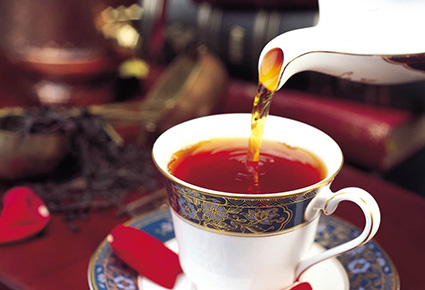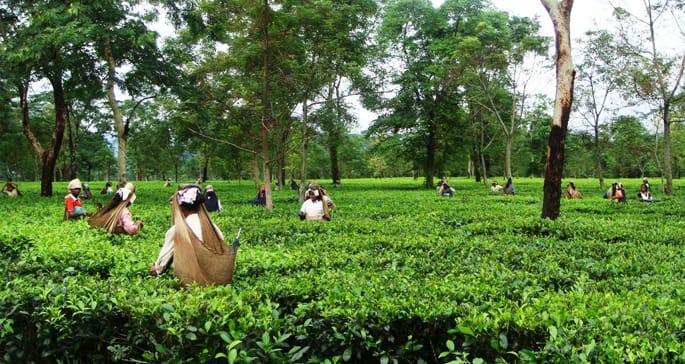Last Updated on December 15, 2024 2:38 pm by INDIAN AWAAZ
Tea is more than just a beverage. It provides both a business opportunity and health benefits. It has become a means of communication for connecting with people, writes Dr Birbal Jha on International Tea Day December 15th.

Tea is more than just a drink now. It has evolved into a mode of communication, a business tool, and, for many, one of the bare essentials. It has become a courtesy to offer a guest a cup of tea. Whether it’s a morning ritual or an evening delight, tea brings people together in many ways. It has enriched the English language as well. Look! It is just my cup of tea; it is not your cup of tea. There are slangs like ‘What’s the tea about?’ ‘Don’t spill the tea.’ Or ‘the tea is piping hot.’.
Wake up and smell the coffee! Tea has a fascinating history that dates back to ancient China. It was initially used for a medicinal purpose. It has gradually become a cultural staple. The global spread of tea can be attributed to British colonialism.
During British rule in India, the English would give away free tea to the Indians to introduce their beverage. The goal was to make tea a staple drink in Indian homes, and the endeavour eventually paid off. Tea gradually got ingrained in Indian culture, impacting social interactions, traditions, and culinary preferences.
Tea is not just something you sip or drink. It has evolved into a food experience. So, many people eat tea. High tea, a late afternoon or early evening meal that usually includes cooked food, bread, butter, and tea, has become more fashionable in corporate culture or at certain events. So is the case with a tea party.
Whether it’s a light snack in the afternoon or a breakfast ritual, tea has found its place in Indian cuisine. Tea, served with roti, the traditional flatbread, has resulted in a one-of-a-kind pairing that millions enjoy here.
This cultural transformation from a simple beverage to a food staple shows just how deeply tea has impacted Indian society. Now, it’s about relishing the aroma, taste, and comfort that tea provides, often accompanied by the simple pleasures of food and company.
Tea as a Medicinal Drink
Tea has been used medicinally for ages. It treats a variety of illnesses, including sore throats and headaches. Tea’s therapeutic significance has recently received widespread awareness. There is now a thriving industry for herbal teas and blends, each with its own set of health benefits.
Many folks begin complaining about headaches and a lack of energy while craving a cup of tea. It’s an essential part of their wellness routine. Whether it’s the relaxing effects of chamomile tea or the revitalising characteristics of green tea, people have grown to rely on tea for its therapeutic advantages. Tea’s warm, comforting nature also allows individuals to unwind after a long day, making it a popular stress reliever.
Tea and its Connection to Business and Communication
Tea has also become a means of communication. It is often said, “Just meet over a cuppa.” Tea breaks have become a ritual in workplaces and social settings alike. It’s a time for people to come together, share ideas, and foster relationships. In India, tea stalls are buzzing with conversations, from casual chats to serious discussions. Tea has facilitated not just social interactions but also business deals, as it provides an informal space where people can meet and converse with each other. It bridges the gap between the rich and the poor as tea is everywhere.
This informal tea culture has played a key role in the growth of small businesses. Tea vendors and stalls have become integral parts of Indian urban and rural life. These tea vendors, many of whom run family businesses, have become an important part of the Indian economy. It’s not just about selling tea; it’s about providing a space for people to meet and connect. Total business of the tea market in India is reported to be around US$ 11 billion.

The Impact of Narendra Modi’s Rise on the Tea Business
The rise of Narendra Modi, India’s current Prime Minister, has also had a significant impact on the tea business in the country. Modi’s rise from a humble background, where he worked as a chaiwallah (tea vendor), to the highest office in the country has inspired many in the tea industry. As a former tea seller, Modi’s story has given a sense of pride to tea vendors across India. Today, these tea vendors feel a sense of accomplishment and empowerment, knowing that the man leading their country once worked in their shoes. He was a tea vendor who later redefined the legal tender.
When people buy tea from vendors today, they often remember that their Prime Minister, who was once a chaiwallah, has risen to prominence. Modi’s association with tea has brought a sense of legitimacy and respect to the tea business. His rise symbolizes the hard work and determination that can lead to success, even from the most modest beginnings. This connection between Modi’s story and the tea business has inspired a new generation of tea sellers to dream big and strive for success.
Tea as a Social and Political Tool
Tea has a tremendous impact on India’s social and political scene. It has become an effective tool for socialising, politicking, and conveying messages. In fact, during elections, political leaders frequently meet with the public over a cup of tea, utilising it as a way to connect with voters. This simple beverage has the ability to break down barriers, allowing people to express their problems and exchange ideas.
Large chunks of people in India sip tea while listening to the speeches of political leaders, especially during the election season. Tea has thus become a vehicle for political discourse and a way to engage with the public. For many politicians, meeting over tea is a way to connect with the common people, understand their needs, and gain their support. It’s a practice that has helped bring politics closer to the people, fostering a sense of inclusivity and community.
A Global Phenomenon
Tea is enjoyed by billions of people worldwide, from China to the United Kingdom and Japan to the United States. It has transcended geographical boundaries, becoming a global symbol of unity, friendship, and tradition. Whether it’s the delicate green tea of Japan or the strong chai of India, tea brings people together across cultures and continents. It is also a sustainable product, with efforts being made globally to promote fair trade and eco-friendly tea cultivation practices.
It is clear that tea is more than just a beverage. It provides both a business opportunity and health benefits. It has become a means of communication for connecting with people. It also acts as a commercial tool, becoming an essential component of millions of people’s daily lives. Tea’s metamorphosis from a basic beverage to a gastronomic delight, besides social and political significance, makes it an indispensable part of our lives. Let’s mark International Tea Day on December 15th.
